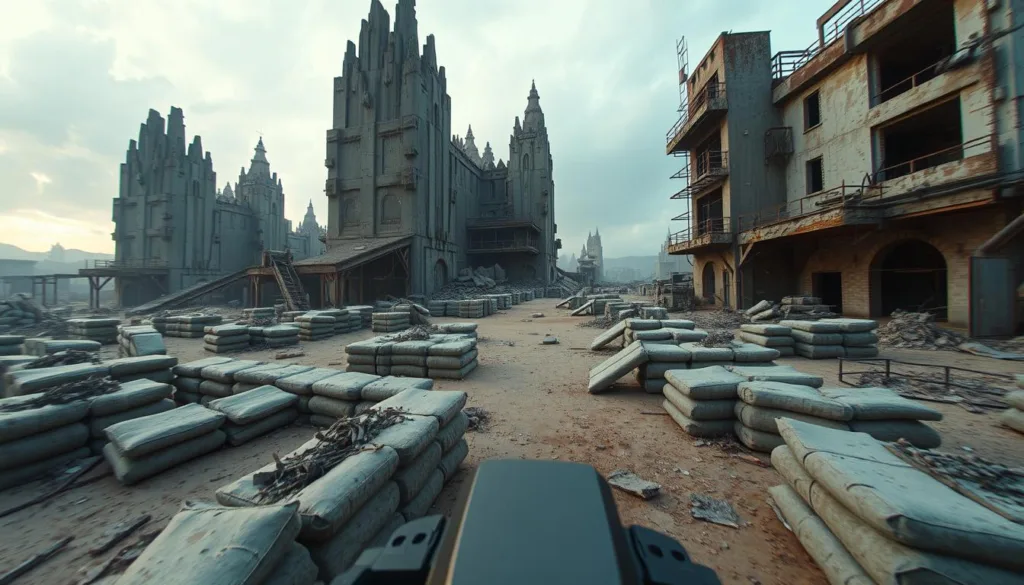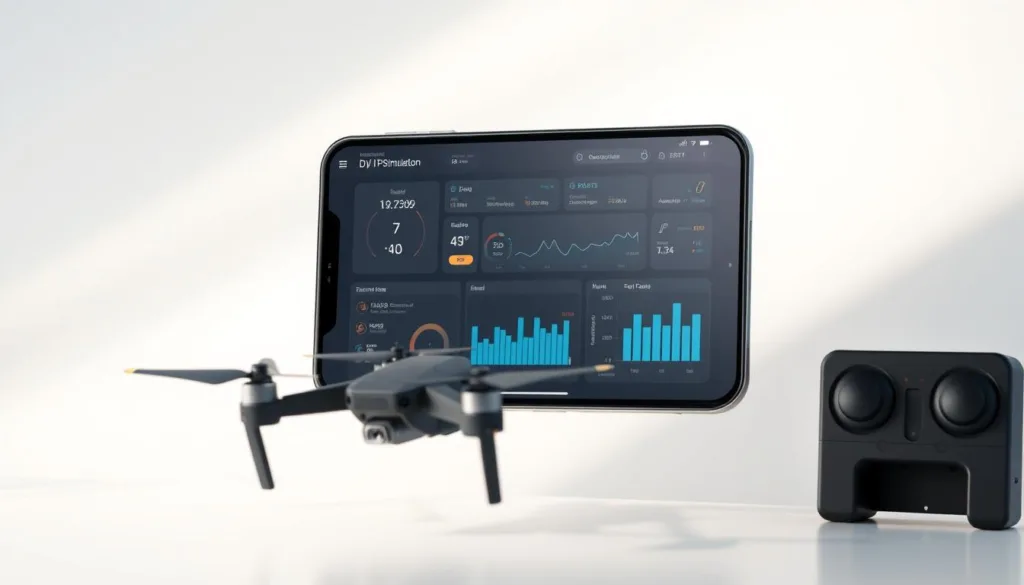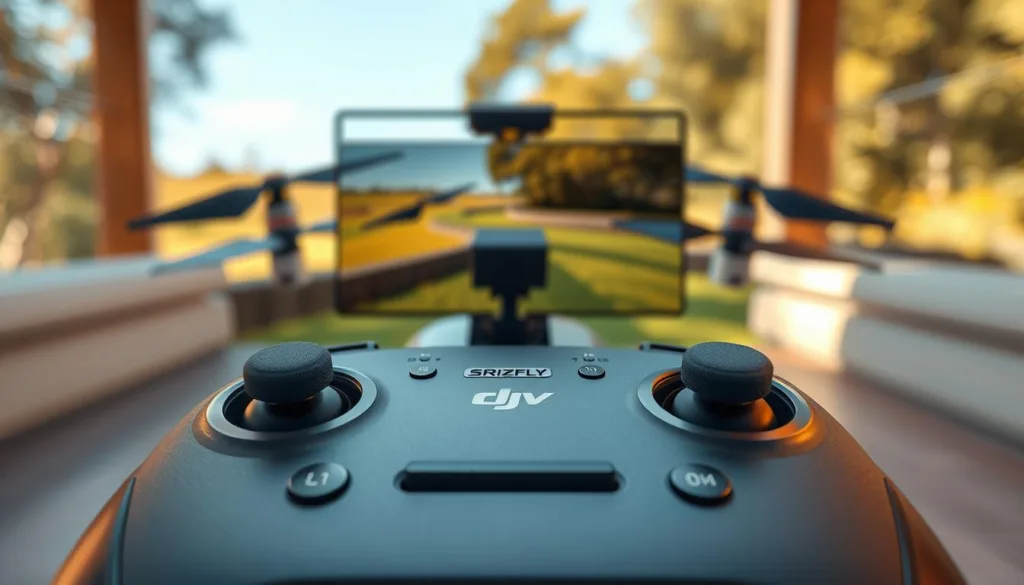Welcome to the ultimate DJI FPV Remote Controller 2 simulator guide! This comprehensive resource is designed to help drone enthusiasts and professionals alike enhance their flying skills using cutting-edge virtual training environments. The integration of the DJI FPV Remote Controller 2 with an FPV drone simulator offers an innovative approach to mastering flight techniques, improving situational awareness, and optimizing performance. Whether you are new to drone flying or looking to sharpen your existing skills, understanding how to utilize the drone flight simulator effectively will put you on the fast track to success.
Key Takeaways
- The DJI FPV Remote Controller 2 is integral to realistic training simulations.
- Simulators provide a risk-free environment for practice.
- Virtual training can accelerate skill acquisition and confidence.
- Diverse flight scenarios can be simulated with advanced technology.
- The use of drone flight simulators can reduce overall training costs.
Introduction to DJI FPV Remote Controller 2
The DJI FPV Remote Controller 2 is an essential component for enthusiasts looking to excel in the world of first-person view (FPV) drones. Its design caters to both novice and experienced pilots, making it a versatile choice for various training environments.
Overview of the Controller’s Features
This remote controller boasts an intuitive interface, allowing users to engage seamlessly with FPV flying. Compatible with the dji fpv remote controller 2 simulator and other various simulators, it provides a comprehensive learning platform. Notable features include ergonomically placed controls, customizable settings, and robust connectivity options, ensuring a smooth flying experience.
Purpose and Benefits
The primary purpose of this controller is to offer precise command over FPV drones such as DJI’s FPV and Avata. Utilizing this device enhances the learning process through dji controller simulation. Pilots can refine essential flying skills in a safe environment created by a remote control simulator. Benefits include a significant reduction in potential accidents during practice, affordability in virtual training, and improved access to advanced flying techniques that would not be easily attainable otherwise.
The Importance of Simulators in Drone Training
Simulators represent a critical component in the training landscape for drone pilots. By offering an immersive virtual flight experience, they allow users to practice and refine their flying skills in a safe environment. Engaging with a fpv drone simulator is beneficial for both novice and experienced pilots, as it creates opportunities to learn various flight maneuvers and techniques.
Enhancing Skills with Virtual Reality
The incorporation of virtual reality in drone flight simulators provides an unparalleled experience. Pilots can navigate challenging scenarios without the fear of damaging equipment. Advanced graphics and physics technology in a drone flight simulator help users adapt to diverse flying conditions, improving their reaction time and decision-making skills.
Reducing Training Costs and Risks
Utilizing simulators significantly reduces training costs, as trainees avoid potential expenses associated with crashes or equipment repairs. By mastering essential skills through a fpv drone simulator, pilots can enter real-world environments with increased confidence and safety. This shift not only preserves resources but also fosters effective training programs that are both economical and efficient.
AR-SkyStrike: A Tactical Training Revolution
The AR-SkyStrike system, created by SRIZFLY, represents a significant advancement in military and security training through its immersive VR technology. This system sets a new standard for tactical training with its unique approach to virtual reality. The combination of realism and interactive environments allows for extensive skills development, while fully utilizing the capabilities of the dji fpv remote controller 2 simulator. Trainees can engage in complex scenarios that closely mirror real-world operations.
Overview of SRIZFLY’s VR Immersive System
SRIZFLY’s VR immersive system incorporates cutting-edge technology to offer unmatched training experiences. By fostering environments that challenge trainees physically and mentally, this system embraces the latest innovations in drone simulation. Trainees can navigate through highly detailed landscapes simulated to replicate actual operational theatres, enhancing their decision-making and problem-solving abilities under pressure.
Features of AR-SkyStrike
The AR-SkyStrike system boasts several features designed to optimize training effectiveness:
- Dynamic electromagnetic interference: This feature simulates the complexities of operating in environments filled with electronic distractions.
- Real-time moving targets: Engaging with moving targets adds a layer of difficulty, mirroring real combat situations.
- Immersive soundscapes: Realistic audio feedback amplifies the training environment, helping to build situational awareness.
- Comprehensive reporting tools: Trainees can review data post-exercise to identify strengths and areas for improvement.
Building Complex Battlefield Environments
Creating immersive and realistic environments is crucial for effective drone training. The fpv drone simulator enables operators to navigate through intricate scenarios that resemble real combat situations. With tools like the dji simulator app, users can experience a variety of settings tailored for operational preparedness.
Types of Simulated Environments
The AR-SkyStrike platform offers a range of simulated environments, each designed to replicate unique battlefield scenarios. Trainees can explore setups such as:
- Military airports
- Ruined cities
- Desert towns
- Command bases
This variety enhances the virtual flight experience, allowing operators to adapt to diverse conditions they might encounter in actual missions.
Examples of Militant Scenarios
Simulated militant scenarios are tailored to sharpen tactical skills. Scenarios can include:
- Special operations involving reconnaissance and stealth
- Counter-terrorism tactics focused on urban targets
- Defensive strategies against simulated enemy forces
Through these multifaceted experiences, operators prepare for real-world challenges, gaining confidence and competence in their skills.

Realistic Combat Elements in Training
The integration of realistic combat elements in training environments is crucial for preparing individuals for actual field scenarios. Features like electromagnetic interference and dynamic moving target simulations enhance the realism of the training experience offered by the dji fpv remote controller 2 simulator. Such elements enable trainees to develop their skills in challenging yet controlled settings.
Electromagnetic Interference Simulation
This simulation plays a significant role in training exercises by mimicking real-life conditions where electronic devices may face interference. Operators can learn to effectively navigate their drones while dealing with disruptions, simulating the challenges faced in combat zones.
Moving Target Dynamics
Engaging with moving targets provides an additional layer of complexity to remote control training. The dji fpv remote controller 2 simulator allows users to practice tracking and engaging targets that are in motion. This aspect of training hones reflexes and precision, essential skills for real missions.
Operational Scenarios with FPV Drones
Utilizing advanced simulations like the dji fpv controller simulation transforms training into an immersive experience. Trainees can practice single-soldier breakthrough tasks, where they navigate challenges as independent operators. These scenarios focus on critical thinking and quick decision-making under pressure, enhancing the skills necessary for real-world operations.
Single-Soldier Breakthrough Tasks
In the single-soldier scenarios, participants engage in uniquely designed missions that test their ability to operate effectively alone. The drone flight simulator provides a safe environment to hone tactics and strategies without the risks associated with live training. This type of exercise allows operators to practice maneuvering through obstacles while managing their drone in dynamic conditions.
Multi-Machine Coordination Exercises
Multi-machine coordination exercises enable trainees to work in teams, emulating real-life operations involving multiple drones. This environment challenges participants to communicate and collaborate, ensuring they understand how to support each other’s missions efficiently. The dji fpv controller simulation fosters a sense of teamwork, allowing for the synchronization of drones to achieve complex objectives seamlessly.
Evaluating Tactical Performance
In the realm of drone training, comprehensive evaluation systems significantly enhance a pilot’s development. By utilizing the dji fpv remote controller 2 simulator, trainers can implement full-process tactical recording. This system allows for detailed review of various aspects of flight performance.
Full-Process Tactical Recording
Full-process tactical recording captures every action taken during a training simulation. This includes flight maneuvers, decision-making processes, and collaborative efforts with other team members. Such recordings create an invaluable resource for post-training analysis, enabling pilots to reflect on their performance in a structured manner.
Intelligent Evaluation Processes
Intelligent evaluation processes offer critical insights derived from data analysis in training. These systems assess a pilot’s strengths and weaknesses, providing targeted feedback that aids in refining skills and improving tactical approaches. Through these evaluations, pilots can identify specific areas that require attention, ultimately leading to heightened operational proficiency.
Data Analysis and Performance Metrics
In the realm of drone training, effective data analysis plays a crucial role in enhancing pilot performance and tracking their progress. The dji simulator app has transformed how learners interact with drones, enabling them to gather critical data that informs their training journey. By analyzing this data, trainers can create tailored training experiences that directly address individual weaknesses and strengths.
Importance of Data in Training
Engagement with the dji simulator app allows for the collection of essential performance data. Such data includes metrics like flight accuracy, response times, and situational awareness. Real-time monitoring enables pilots to understand their flight behaviors and make necessary adjustments. An emphasis on data provides both trainees and trainers with insights that elevate the effectiveness of instructional methods.
Metrics for Assessing Improvement
Metrics for drone training serve as benchmarks that help assess the proficiency of drone pilots. Here are some key performance metrics that trainers frequently evaluate:
| Metric | Description | Significance |
|---|---|---|
| Flight Accuracy | Measures how closely a pilot can follow a predefined flight path. | Indicates the pilot’s ability to control the drone effectively. |
| Response Time | Assesses how quickly a pilot reacts to changes in the environment or unexpected issues. | Reflects situational awareness and decision-making skills. |
| Simulation Hours | Tracks the total time spent training on the dji simulator app. | Helps gauge overall experience and skill development. |
| Flight Consistency | Evaluates the frequency of deviations from ideal flight behavior. | Indicates a pilot’s growth and areas needing improvement. |
Utilizing these metrics, trainers can develop personalized training plans aimed at refining skills, focusing on areas where specific improvements are needed. This data-driven approach promotes a more efficient and effective training experience for all drone pilots.

Advantages of Virtual Training Modes
Virtual training modes are transforming the landscape of drone training, providing substantial advantages for participants. One major benefit is the ability to access training resources globally. This accessibility ensures that military and security personnel can enhance their skills regardless of their location. With the integration of tools like the dji fpv remote controller 2 simulator, practitioners can practice in a controlled environment, honing their capabilities without physical limitations.
Global Access to Training Resources
The shift to virtual training has enabled users from various regions to participate in high-quality training without the necessity for travel or extensive logistics. Training modules can be tailored to various skill levels while maintaining uniformity in training standards. The flexibility of virtual platforms allows for on-demand learning and practice, empowering users to progress at their own pace.
Achieving Zero-Loss in Training
Another significant advantage of virtual drone training is the opportunity to achieve zero-loss in training environments. This concept minimizes the potential for accidents or equipment loss during practice, allowing users to focus entirely on skill development. With advanced simulations, participants can experiment with various tactics and maneuvers, all while preserving their invaluable drones and resources.
Applications for Security and Military
The integration of advanced drone technology into security and military operations is reshaping training paradigms. With tools like the dji fpv remote controller 2 simulator, personnel can hone their skills in more immersive and realistic environments. These applications increasingly highlight the importance of effective training in dynamic scenarios.
Special Operations Training
In special operations training, the use of realistic simulations plays a vital role in preparing military personnel for high-stakes missions. By employing the dji fpv remote controller 2 simulator, trainees can replicate the complex situations they might encounter in actual operations. This approach allows for a hands-on experience where participants can practice strategic maneuvers and assess their decision-making abilities in real time.
Counter-Terrorism Operations
Counter-terrorism operations benefit significantly from the advancements in drone technology. Utilizing military drone applications enables teams to simulate various scenarios, from urban surveillance to reconnaissance missions. Effective training programs leverage the dji fpv remote controller 2 simulator to provide an environment where operators can develop a tactical awareness, enhancing their readiness and effectiveness in the field.
Future Developments in Drone Simulation
The landscape of drone training is on the verge of significant transformation. Emerging technologies promise to enhance the effectiveness and accessibility of training programs. Innovations in drone simulation advancements may create exciting opportunities across various sectors, including military, commercial, and even recreational applications.
Innovations on the Horizon
As the future of drone training becomes more apparent, several key innovations stand out:
- Increased Realism: Advanced graphics and physics engines will provide lifelike scenarios for pilots, making training simulations more effective.
- Augmented Reality Integration: Combining augmented reality with drone simulations can offer enhanced real-world environments for practice, eliminating the need for physical resources.
- Artificial Intelligence: AI algorithms will be utilized to create adaptive training modules that adjust to individual learning curves and performance metrics.
- Cross-Platform Compatibility: Future training platforms will likely allow for seamless integration across different devices, facilitating broader access and usage.
Potential for Broader Applications
The implications of these drone simulation advancements extend beyond traditional training. New applications are emerging in various fields:
- Disaster Response Training: Simulations can prepare responders for real-life scenarios, equipping them to handle emergencies with greater efficiency.
- Search-and-Rescue Operations: Pilots can practice intricate maneuvers in different terrains, enhancing their capabilities for critical missions.
- Agricultural Monitoring: Future simulations may enable pilots to practice crop surveillance, improving techniques for precision agriculture.
- Infrastructure Inspection: Training in simulated environments can prepare drone operators for real-world inspections of bridges, power lines, and buildings.
Conclusion: Elevating Tactical Training with Technology
The integration of the DJI FPV Remote Controller 2 into tactical training programs marks a significant advancement in methodologies for preparing operators for real-world challenges. Utilizing the DJI FPV Remote Controller 2 simulator, trainees can hone essential piloting skills while benefiting from the advantages of simulator training. This technology not only allows for a safe training environment but also creates opportunities for frequent practice without the costs associated with traditional training methods.
Emphasizing Continuous Improvement
Continuous improvement is vital in the dynamic field of drone operations. By effectively utilizing drone flight simulators, trainees can engage in various scenarios that simulate real combat situations, enhancing their decision-making skills and tactical abilities. This consistent practice supports operators in adapting to evolving challenges, ensuring they remain mission-ready and effective in the field.
The Role of DJI FPV Remote Controller 2 in Training
The DJI FPV Remote Controller 2 plays an essential role in facilitating sophisticated training experiences. Its advanced features provide users with a realistic flying experience, bridging the gap between simulation and actual flight. As military and security applications increasingly rely on drone technology, real-time simulations using this controller are crucial for developing proficient pilots prepared for any operational mission.
FAQ
What is the DJI FPV Remote Controller 2?
The DJI FPV Remote Controller 2 is designed for flying FPV drones, such as the DJI FPV and Avata. It features a user-friendly interface and integrates seamlessly with various simulators, enhancing the overall training experience.
How do simulators benefit drone training?
Simulators provide a safe and immersive virtual reality environment where pilots can practice flying without the risks associated with real-life operations. They help reduce costs related to equipment loss and allow users to gain experience in varying flying conditions.
What is the AR-SkyStrike system?
Developed by SRIZFLY, AR-SkyStrike is a VR immersive system designed to provide military and security training in complex battlefield scenarios, complete with dynamic electromagnetic interference and moving targets to enhance realism.
How does AR-SkyStrike simulate tactical scenarios?
The system offers various simulated environments, such as military airports and ruined cities, where users can practice special operations and counter-terrorism tactics under conditions that closely mimic actual combat situations.
What are some key features of AR-SkyStrike?
AR-SkyStrike includes full-process tactical recording and intelligent evaluation processes that allow for comprehensive performance reviews, helping pilots improve their tactics and strategies effectively.
How is performance measured in training?
Performance metrics in drone training may include flight accuracy, reaction times, and situational awareness, which are essential for developing personalized training plans to enhance each participant’s skills.
Can I access virtual training resources globally?
Yes! Virtual training modes enable global access to training resources, allowing military and security personnel to maintain consistent skills and readiness regardless of their physical location.
What future developments can we expect in drone simulation technology?
Continued innovations in drone simulation technology may lead to broader applications, particularly in civilian sectors such as disaster response and search-and-rescue missions, expanding the potential for immersive training opportunities.
How does the DJI FPV Remote Controller enhance training?
The DJI FPV Remote Controller 2 facilitates precise control over FPV drones, allowing users to refine their flying skills in a controlled and risk-free environment, ultimately improving their readiness for real-world challenges.



